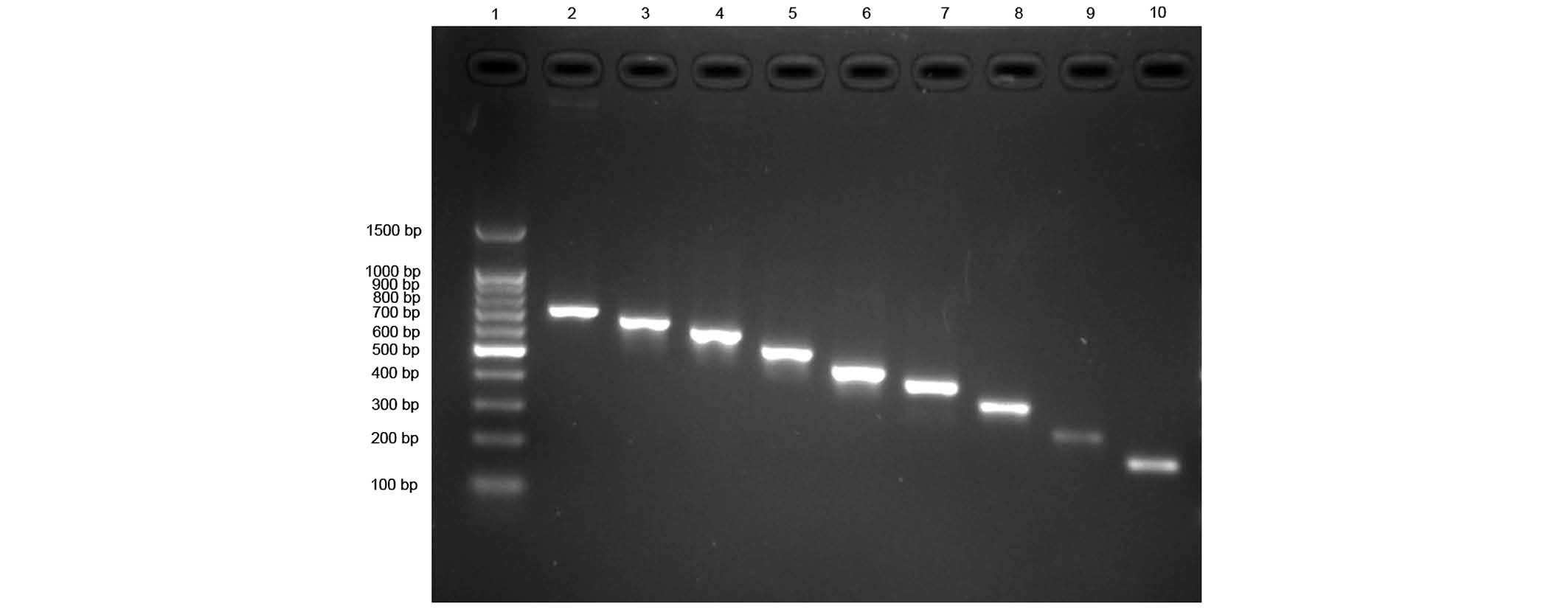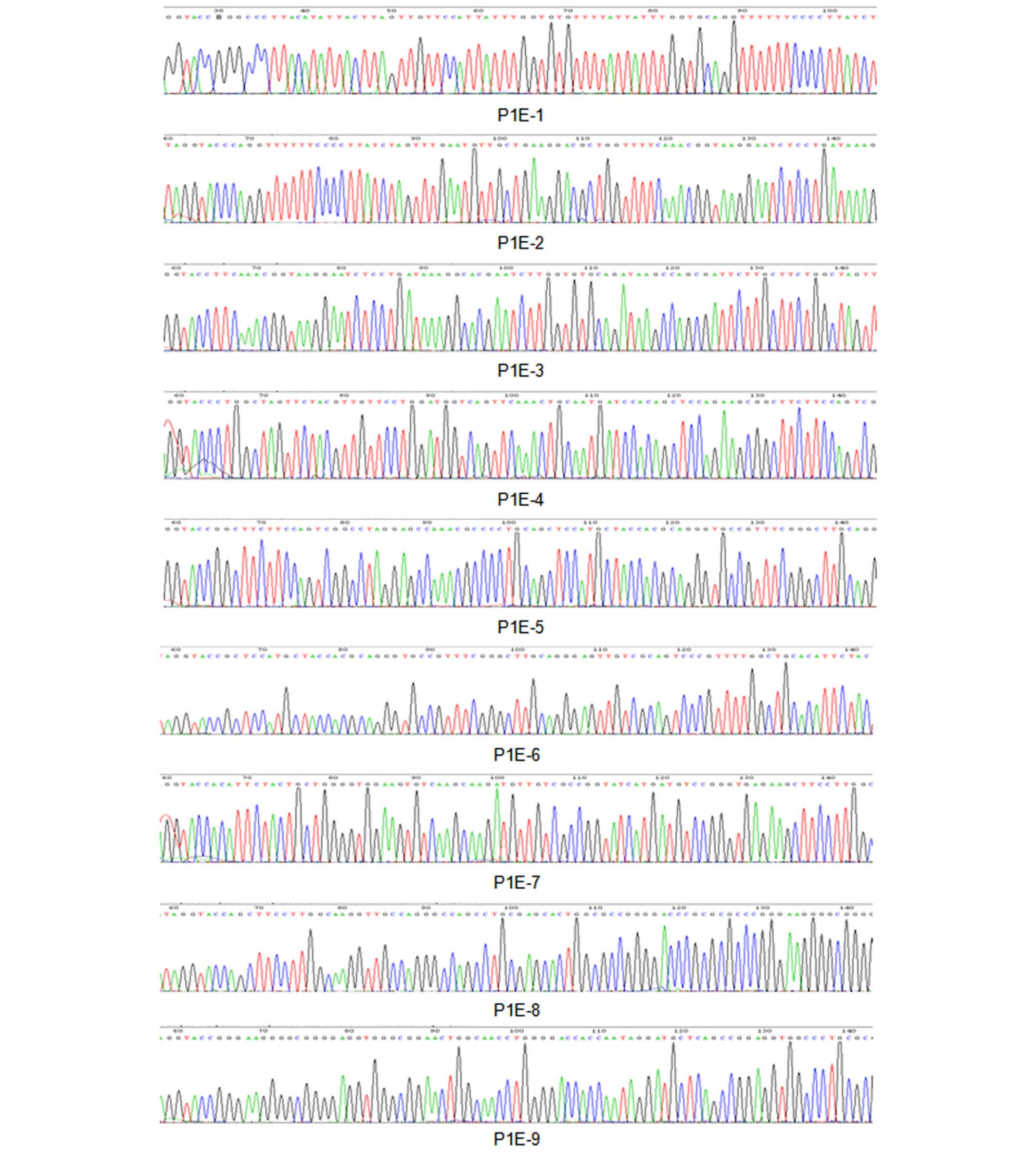|
1
|
Tabas I: The stimulation of the
cholesterol esterification pathway by atherogenic lipoproteins in
macrophages. Curr Opin Lipidol. 6:260–268. 1995. View Article : Google Scholar : PubMed/NCBI
|
|
2
|
Chang CC, Sakashita N, Ornvold K, Lee O,
Chang ET, Dong R, Lin S, Lee CY, Strom SC, Kashyap R, et al:
Immunological quantitation and localization of ACAT-1 and ACAT-2 in
human liver and small intestine. J Biol Chem. 275:28083–28092.
2000.PubMed/NCBI
|
|
3
|
Lee O, Chang CC, Lee W and Chang TY:
Immunodepletion experiments suggest that acyl-coenzyme A:
Cholesterol acyl-transferase-1 (ACAT-1) protein plays a major
catalytic role in adult human liver, adrenal gland, macrophages,
and kidney, but not in intestines. J Lipid Res. 39:1722–1727.
1998.PubMed/NCBI
|
|
4
|
Sakashita N, Miyazaki A, Takeya M,
Horiuchi S, Chang CC, Chang TY and Takahashi K: Localization of
human acyl-coenzyme A: Cholesterol acyltransferase-1 (ACAT-1) in
macrophages and in various tissues. Am J Pathol. 156:227–236. 2000.
View Article : Google Scholar : PubMed/NCBI
|
|
5
|
Saraon P, Trudel D, Kron K,
Dmitromanolakis A, Trachtenberg J, Bapat B, van der Kwast T, Jarvi
KA and Diamandis EP: Evaluation and prognostic significance of
ACAT1 as a marker of prostate cancer progression. Prostate.
74:372–380. 2014. View Article : Google Scholar
|
|
6
|
Murphy SR, Chang CC, Dogbevia G, Bryleva
EY, Bowen Z, Hasan MT and Chang TY: Acat1 knockdown gene therapy
decreases amyloid-β in a mouse model of Alzheimer's disease. Mol
Ther. 21:1497–1506. 2013. View Article : Google Scholar : PubMed/NCBI
|
|
7
|
Dharuri H, 't Hoen PA, van Klinken JB,
Henneman P, Laros JF, Lips MA, El Bouazzaoui F, van Ommen GJ,
Janssen I, van Ramshorst B, et al: Downregulation of the acetyl-CoA
metabolic network in adipose tissue of obese diabetic individuals
and recovery after weight loss. Diabetologia. 57:2384–2392. 2014.
View Article : Google Scholar : PubMed/NCBI
|
|
8
|
Li BL, Li XL, Duan ZJ, Lee O, Lin S, Ma
ZM, Chang CC, Yang XY, Park JP, Mohandas TK, et al: Human acyl-coA:
Cholesterol acyltransferase-1 (ACAT-1) gene organization and
evidence that the 4.3-Kilobase ACAT-1 mRNA is produced from two
different chromosomes. J Biol Chem. 274:11060–11071. 1999.
View Article : Google Scholar : PubMed/NCBI
|
|
9
|
Ge J, Zhai W, Cheng B, He P, Qi B, Lu H,
Zeng Y and Chen X: Insulin induces human acyl-coenzyme A:
Cholesterol acyl-transferase 1 gene expression via MAP kinases and
CCAAT/enhancer-binding protein α. J Cell Biochem. 114:2188–2198.
2013. View Article : Google Scholar : PubMed/NCBI
|
|
10
|
Yang JB, Duan ZJ, Yao W, Lee O, Yang L,
Yang XY, Sun X, Chang CC, Chang TY and Li BL: Synergistic
transcriptional activation of human Acyl-coenzyme A: Cholesterol
acyltransterase-1 gene by interferon-gamma and all-trans-retinoic
acid THP-1 cells. J Biol Chem. 276:20989–20998. 2001. View Article : Google Scholar : PubMed/NCBI
|
|
11
|
Chang TY, Chang CC and Cheng D:
Acyl-coenzyme A: Cholesterol acyltransferase. Annu Rev Biochem.
66:613–638. 1997. View Article : Google Scholar
|
|
12
|
Yang L, Yang JB, Chen J, Yu GY, Zhou P,
Lei L, Wang ZZ, Cy Chang C, Yang XY, Chang TY and Li BL:
Enhancement of human ACAT1 gene expression to promote the
macrophage-derived foam cell formation by dexamethasone. Cell Res.
14:315–323. 2004. View Article : Google Scholar : PubMed/NCBI
|
|
13
|
Maung K, Miyazaki A, Nomiyama H, Chang CC,
Chang TY and Horiuchi S: Induction of acyl-coenzyme A: Cholesterol
acyltransferase-1 by 1,25-dihydroxyvitamin D(3) or 9-cis-retinoic
acid in undifferentiated THP-1 cells. J Lipid Res. 42:181–187.
2001.PubMed/NCBI
|
|
14
|
Lei L, Xiong Y, Chen J, Yang JB, Wang Y,
Yang XY, Chang CC, Song BL, Chang TY and Li BL: TNF-alpha
stimulates the ACAT1 expression in differentiating monocytes to
promote the CE-laden cell formation. J Lipid Res. 50:1057–1067.
2009. View Article : Google Scholar : PubMed/NCBI
|
|
15
|
Hori M, Miyazaki A, Tamagawa H, Satoh M,
Furukawa K, Hakamata H, Sasaki Y and Horiuchi S: Up-regulation of
acyl-coenzyme A: Cholesterol acyltransferase-1 by transforming
growth factor-beta1 during differentiation of human monocytes into
macrophages. Biochem Biophys Res Commun. 320:501–505. 2004.
View Article : Google Scholar : PubMed/NCBI
|
|
16
|
Suguro T, Watanabe T, Kanome T, Kodate S,
Hirano T, Miyazaki A and Adachi M: Serotonin acts as an
up-regulator of acyl-coenzyme A: Cholesterol acyltransferase-1 in
human monocyte-macrophages. Atherosclerosis. 186:275–281. 2009.
View Article : Google Scholar
|
|
17
|
Hongo S, Watanabe T, Arita S, Kanome T,
Kageyama H, Shioda S and Miyazaki A: Leptin modulates ACAT1
expression and cholesterol efflux from human macrophages. Am J
Physiol Endocrinol Metab. 297:E474–E482. 2009. View Article : Google Scholar : PubMed/NCBI
|
|
18
|
Nagashima M, Watanabe T, Terasaki M,
Tomoyasu M, Nohtomi K, Kim-Kaneyama J, Miyazaki A and Hirano T:
Native incretins prevent the development of atherosclerotic lesions
in apolipoprotein E knockout mice. Diabetologia. 54:2649–2459.
2011. View Article : Google Scholar : PubMed/NCBI
|
|
19
|
Zhao ZZ, Wang Z, Li GH, Wang R, Tan JM,
Cao X, Suo R and Jiang ZS: Hydrogen sulfide inhibits
macrophage-derived foam cell formation. Exp Biol Med (Maywood).
236:169–176. 2011. View Article : Google Scholar
|
|
20
|
Furukawa K, Hori M, Ouchi N, Kihara S,
Funahashi T, Matsuzawa Y, Miyazaki A, Nakayama H and Horiuchi S:
Adiponectin down-regulates acyl-coenzyme A: Cholesterol
acyltransferase-1 in cultured human monocyte-derived macrophages.
Biochem Biophys Res Commun. 317:831–836. 2004. View Article : Google Scholar : PubMed/NCBI
|
|
21
|
Wan JJ, Cheng B, Wang YF, Mei CL, Liu W,
Ke L and He P: Ghrelin down-regulates ACAT-1 in THP-1 derived foam
cells via growth hormone secretagogue receptor-dependent pathway.
Zhonghua Xin Xue Guan Bing Za Zhi. 37:1030–1034. 2009.In
Chinese.
|
|
22
|
Smith JL, Rangaraj K, Simpson R, Maclean
DJ, Nathanson LK, Stuart KA, Scott SP, Ramm GA and de Jersey J:
Quantitative analysis of the expression of ACAT genes in human
tissues by real-time PCR. J Lipid Res. 45:686–696. 2004. View Article : Google Scholar : PubMed/NCBI
|



















